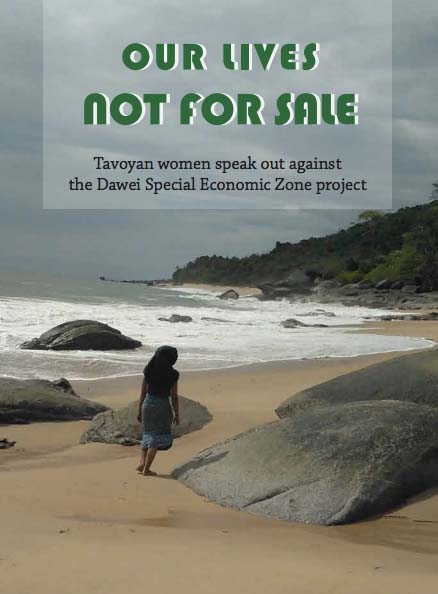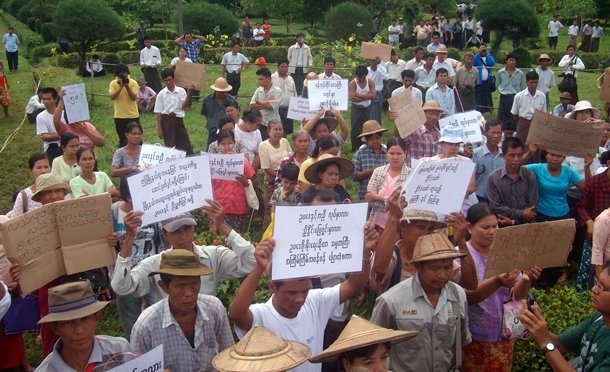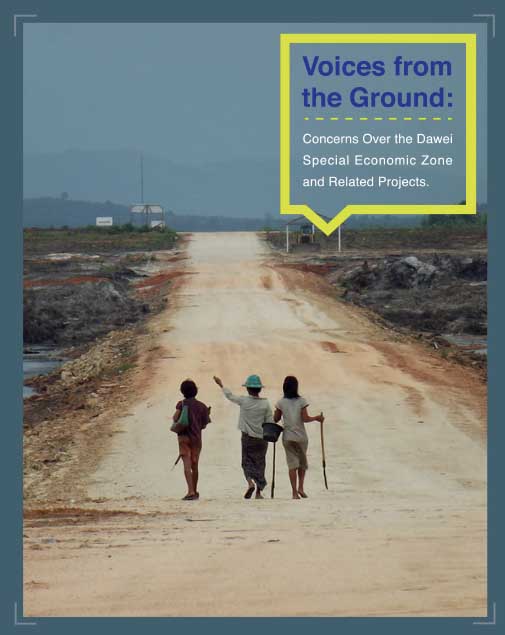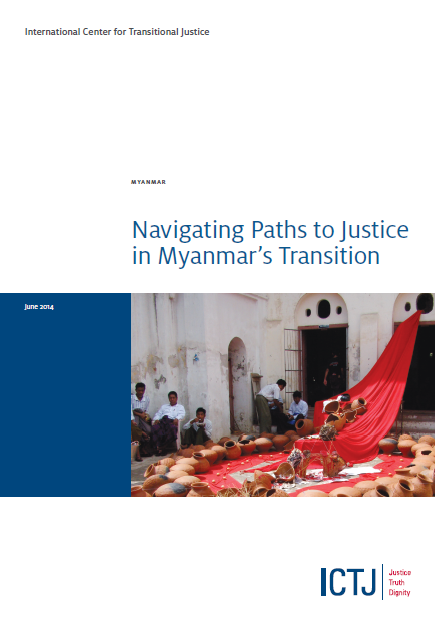Posts Tagged ‘Dawei Special Economic Zone’ (12 found)
Local Groups Demand Accountability Upon Japan’s Announcement of Official Involvement in the Dawei SEZ
On August 4th, local community groups from Dawei (southern Burma) sent a letter to the Japanese Foreign Ministry, the Japan International Cooperation Agency (JICA), and the Japan Bank for International Cooperation (JBIC) after Japan officially announced its involvement in the Dawei Special Economic Zone (SEZ) development project and related projects […]
• • •Women Activists Facing Harassment by Proponents of Dawei Special Economic Zone
The Tavoyan Women’s Union (TWU) is gravely concerned at increasing harassment and intimidation of women who have been raising concerns about the impacts of the Dawei Special Economic Zone (DSEZ) and related projects […]
• • •Our Lives Not For Sale: Tavoyan Women Speak Out Against the Dawei Special Economic Zone Project
 This report exposes the damaging impacts of the Dawei Special Economic Zone (DSEZ) project on rural Tavoyan women living in six affected villages in southern Burma. Most of the local population are fisherfolk and farmers, who have lived sustainably for generations in this isolated coastal area. They have been given no choice about accepting this multi-billion dollor Thailand-Burma joint venture, which will turn their pristine lands into the largest petrochemical estate in Southeast Asia […]
This report exposes the damaging impacts of the Dawei Special Economic Zone (DSEZ) project on rural Tavoyan women living in six affected villages in southern Burma. Most of the local population are fisherfolk and farmers, who have lived sustainably for generations in this isolated coastal area. They have been given no choice about accepting this multi-billion dollor Thailand-Burma joint venture, which will turn their pristine lands into the largest petrochemical estate in Southeast Asia […]
New National Land Use Policy Must Reflect the Concerns of those Affected
 The Burma Government released its draft land use policy document and opened it up for consultations with the public. Despite this positive sign, the time for consultations is inadequate with no proper mechanism or space created for the meaningful participation of affected communities in order for their concerns to be reflected in the draft. The draft document itself has been heavily criticized for serving to further empower investors over small scale farmers.
The Burma Government released its draft land use policy document and opened it up for consultations with the public. Despite this positive sign, the time for consultations is inadequate with no proper mechanism or space created for the meaningful participation of affected communities in order for their concerns to be reflected in the draft. The draft document itself has been heavily criticized for serving to further empower investors over small scale farmers.
Since the beginning of the reform process in 2011, land grabbing, a practice that the previous military regime engaged in regularly, has hit new heights as a flurry of investors seek opportunities in previously untapped markets and the Burma Government liberalizes the economy. A prime example of this is the Dawei Special Economic Zone (SEZ) Project, a joint Thailand–Burma Government initiative that is seeking private investment to create one of the largest industrial zones in Asia. A report released by Dawei Development Association on 21 October 2014 highlights how 20-36 villages will be negatively affected. Concerns iterated by the local communities show that they have “lost farmlands and natural resources that are vital to their livelihoods, without prior information.” Furthermore “there was no meaningful consultation, and a deeply flawed compensation process.”
Land grabbing is often done with protection from the military, or by the military itself, for factories, infrastructure projects, mono-crop plantations, or military bases, and as with the Dawei SEZ case, usually without adequate or indeed, any compensation. It is a nationwide problem, both in ethnic areas, as documented by the Human Rights Foundation of Monland and Karen Human Rights Group, while in central Burma and delta areas, land grabbing is common place. Given that around 70% of the population of Burma is engaged in agriculture, and it is agricultural lands that are most often confiscated, it is one of the most pressing issues for Burma today […]
• • •Voices from the Ground: Concerns over the Dawei Special Economic Zone and Related Projects
 The report “Voices from the Ground: Concerns over the Dawei Special Economic Zone and Related Projects” calls on the National Human Rights Commissions of Thailand and Myanmar to collaborate and carry out a full investigation into all complaints of human rights abuses, relating to land confiscations and forced evictions as a consequence of the Dawei SEZ project activities or operations conducted by companies domiciled in Thailand or Myanmar.
The report “Voices from the Ground: Concerns over the Dawei Special Economic Zone and Related Projects” calls on the National Human Rights Commissions of Thailand and Myanmar to collaborate and carry out a full investigation into all complaints of human rights abuses, relating to land confiscations and forced evictions as a consequence of the Dawei SEZ project activities or operations conducted by companies domiciled in Thailand or Myanmar.
Local Communities from Dawei Call for Human Rights Violations to be Addressed in Special Economic Zone
Bangkok, Thailand – Community representatives from areas affected by the Dawei Special Economic Zone (DSEZ) questioned today how the mega-project could go ahead when so many social and environmental impacts and human rights violations have already taken place that have not been addressed. These problems need to be resolved first, before considering a new phase to this already problematic project […]
• • •Network Calls for Significant Problems to be Addressed Before Dawei SEZ Project Revived
Dawei Development Association (DDA) calls on the Myanmar and Thai governments to refrain from reviving the Dawei Special Economic Zone (DSEZ) development project unless the problems associated with the project thus far are remedied and international best practices are in place going forward. The Prime Minister of Thailand, retired general, Prayuth Chan-ocha, is visiting Myanmar this week, as his first overseas visit since taking power earlier this year. The leaders of both countries are due to meet to discuss reviving the stalled Dawei deep-sea port and Special Economic Zone development project […]
• • •Navigating Paths to Justice in Myanmar’s Transition
Since President Thein Sein and his government took office in 2011, Myanmar’s transition has unfolded at a pace that has surprised many and earned the acclaim of western governments, financial institutions, and private-sector investment analysts.1 The Burmese population of approximately 60 million has endured more than a half-century of military dictatorship, armed conflict, economic dysfunction, and political repression.2 A meaningful transformation into a peaceful society that enjoys economic development and functions democratically now seems plausible, though it is far from guaranteed. Ultimately, the blanket immunity afforded by the 2008 Constitution shields the acts attributable to prior regimes from any form of accountability.3 Whether the reform process will evolve to include measures that address the massive and systematic injustices of the past remains less certain.
• • •Thai Oversea Investment on Coal Mining in Myanmar: The Private Business Violating Human Rights and Causing Environmental Impact on Ethnic Communities along Tenasserim Border
Tanintharyi Hills or Tanintharyi Range is the geographical name of a roughly 1,700 km long mountain chain, part of the Indo-‐Malayan mountain system in Southeast Asia. The Tanintharyi Range covered with lush green forest and is a natural border line between Thailand and Myanmar. Across the hills in Myanmar side is Tanintharryi Region. The capital of this administrative region is Dawei which consists of diverse of ethnicity such as Dawei or Tavoy, Karen or Khayin and Mon. The local languages spoken by majority of the population are Tavoyan and Karen. In the past, the areain which bordering near Kanchanaburi province of Thailand was a former war zone between Karen ethnic group and Burmese junta government. It was intense conflict war zone during 1996 -‐ 1997 until cease fire agreement between the Burmese junta and the Karen National Union (KNU) was signed in 2012 […]
• •New Investment in Dawei Project Must Follow International Best Practices
Ahead of this week’s Japan-ASEAN summit, the Dawei Development Association calls on the Japanese government, development agencies and investors to refrain from investing in the Dawei Special Economic Zone (SEZ) in Tanintharyi Region until international best practices are firmly […]
• • •









 All posts
All posts